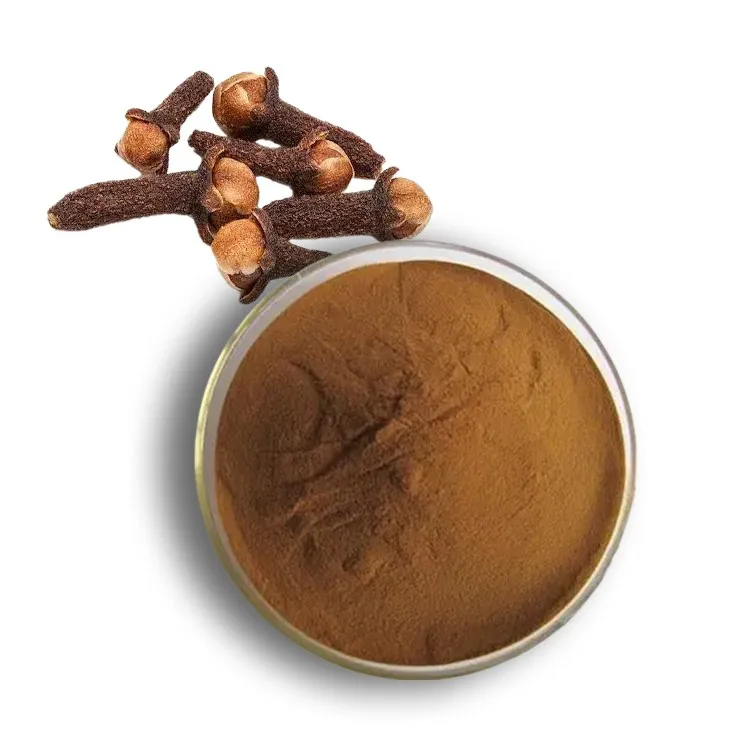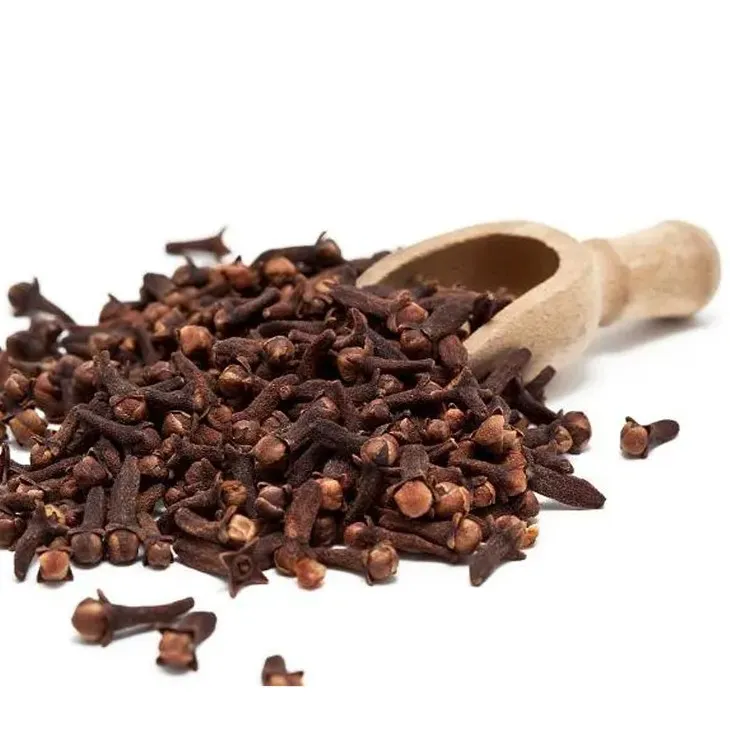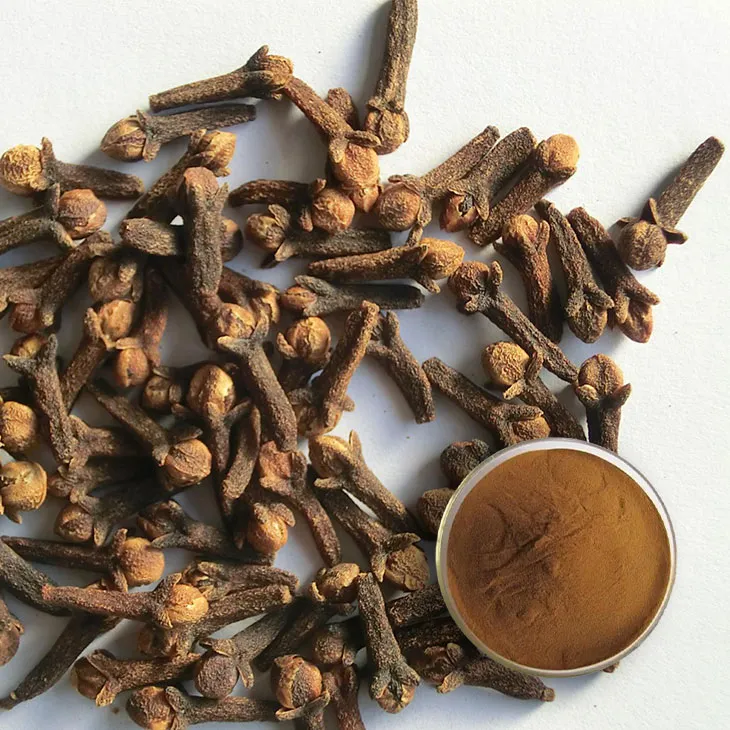- 0086-571-85302990
- sales@greenskybio.com
What is clove powder? Definition, types, history and nutritional value.
2024-12-19

1. Definition
Clove Powder, also known as ground cloves, is a spice that plays an important role in the culinary and medicinal fields. It is made by grinding dried cloves. These cloves are the flower buds of the Syzygium aromaticum tree. The Syzygium aromaticum tree is native to the Maluku Islands in Indonesia. These small, reddish - brown flower buds are carefully harvested and then dried. Once dried, they can be ground into a fine powder, which is what we know as Clove Powder. This powder has a very strong, pungent and sweet - spicy aroma. It is this unique aroma that makes it a popular ingredient in many different types of cuisine and also in various traditional medicines.

2. Types
When it comes to types of Clove Powder, there are no extremely distinct types in the sense of major variations. However, the quality of clove powder can vary significantly depending on the origin of the cloves used.
2.1 Indonesian Cloves
Indonesian cloves are often highly regarded in the market. Indonesia is the native place of cloves, and the climate and soil conditions there are very suitable for the growth of Syzygium aromaticum trees. The cloves harvested in Indonesia are usually of high quality. They tend to have a more intense and pure flavor compared to cloves from other regions. When these high - quality Indonesian cloves are ground into powder, the resulting clove powder also has a superior flavor profile. It is often used in high - end cooking and in the production of some premium - grade traditional medicines.
2.2 Cloves from Other Regions
Cloves are also grown in other parts of the world, such as Madagascar and Tanzania. The cloves from these regions can also be used to make clove powder. However, due to differences in climate, soil, and cultivation methods, the flavor and quality of the clove powder made from these cloves may be slightly different from that made from Indonesian cloves. For example, cloves from Madagascar may have a slightly different aroma, which may be a bit more earthy or floral compared to the pure, intense aroma of Indonesian cloves. Nevertheless, they are still used in various applications depending on the availability and cost - effectiveness in different markets.

3. History
The history of clove powder is long and fascinating, with a global reach that spans across different continents and cultures.
3.1 In Asia
- In ancient times, cloves were widely used in Asia. In traditional Chinese medicine, cloves have been used for thousands of years. They were believed to have various medicinal properties, such as warming the middle - jiao (a concept in traditional Chinese medicine related to the digestive system), relieving pain, and expelling cold. Cloves were often used in the form of decoctions or as an ingredient in herbal formulas.
- In India, cloves were an important part of Ayurveda, one of the world's oldest holistic healing systems. Ayurvedic practitioners used cloves for treating digestive problems, respiratory ailments, and as a general tonic for the body. Clove powder was used in Ayurvedic preparations such as herbal pastes and powders.
3.2 In the Spice Trade Routes
- Cloves were a prized spice in the spice trade routes. The Maluku Islands, being the origin of cloves, became a center of attraction for merchants from all over the world. Arab traders were among the first to discover the value of cloves and started trading them as early as the 4th century AD. They carried cloves to different parts of the Middle East and Europe, where they were highly sought after.
- During the Age of Exploration in the 15th and 16th centuries, European powers such as the Portuguese, Dutch, and English fought over control of the spice trade, especially for cloves. The Dutch eventually gained a monopoly over the clove trade in the Maluku Islands for a long time. This led to the widespread distribution of cloves and, by extension, clove powder across the globe. As a result, cloves became a common ingredient in European cuisine, especially in baked goods, stews, and mulled wines.

4. Nutritional Value
Clove powder contains several beneficial compounds that contribute to its various health - promoting properties.
4.1 Antioxidants
- One of the most important components in clove powder is eugenol. Eugenol is a powerful antioxidant. In the body, antioxidants play a crucial role in combating oxidative stress. Oxidative stress occurs when there is an imbalance between the production of free radicals and the body's ability to neutralize them. Free radicals are highly reactive molecules that can damage cells, proteins, and DNA. By providing antioxidant activity, eugenol in clove powder can help protect the body's cells from this damage. This may potentially reduce the risk of chronic diseases such as cancer, heart disease, and neurodegenerative disorders.
4.2 Antimicrobial Properties
- Clove powder also has antimicrobial properties. It can inhibit the growth of various microorganisms, including bacteria, fungi, and viruses. The antimicrobial activity of clove powder is mainly due to the presence of compounds like eugenol. In the field of food preservation, clove powder can be used to prevent the growth of spoilage - causing microorganisms in food. In traditional medicine, it has been used to treat infections, especially those related to the oral cavity. For example, clove powder can be used as a natural remedy for toothache, as it can kill the bacteria causing the infection and relieve the pain.
4.3 Digestive Aid
- Clove powder may aid in digestion. It can stimulate the production of digestive enzymes in the body. Digestive enzymes are essential for breaking down food into smaller components that can be absorbed by the body. By increasing the production of these enzymes, clove powder can improve the efficiency of the digestive process. This can be beneficial for people with digestive problems such as indigestion, bloating, and constipation. Additionally, the warm and spicy nature of clove powder can also help to soothe the digestive tract and relieve discomfort.
FAQ:
What are the main uses of clove powder?
Clove powder is mainly used as a spice in cooking, adding a warm, sweet, and slightly spicy flavor to dishes. It is also used in the production of some traditional medicines, such as in Ayurveda and traditional Chinese medicine, due to its potential health - promoting properties like antioxidant and antimicrobial effects.
How can one determine the quality of clove powder?
The quality of clove powder can be determined by several factors. Firstly, the origin of the cloves used to make it is important. Cloves from regions like Indonesia are often considered of high quality. Secondly, the aroma should be strong and characteristic of cloves. A fresh and intense smell indicates better quality. Also, the color should be a consistent brownish hue, and there should be no signs of mold or spoilage.
Can clove powder be used in baking?
Yes, clove powder can be used in baking. It pairs well with ingredients like cinnamon, nutmeg, and allspice. It can be added to recipes for cakes, cookies, pies, and bread to add a unique and warm flavor. However, it should be used in moderation as its flavor is quite strong.
What are the potential side effects of consuming clove powder?
While clove powder has many beneficial properties, excessive consumption can have some side effects. High amounts may cause irritation in the mouth, throat, and digestive tract. It can also potentially lower blood sugar levels, so people with diabetes should be cautious when using it in large quantities. Additionally, some people may be allergic to cloves, and in such cases, consumption of clove powder can lead to allergic reactions.
How should clove powder be stored?
Clove powder should be stored in a cool, dry, and dark place. An airtight container is ideal to prevent moisture and air from spoiling it. Stored properly, it can maintain its flavor and quality for a relatively long time. It is also advisable to keep it away from strong - smelling substances as it can absorb odors easily.
Related literature
- The Nutritional and Medicinal Properties of Spices: A Comprehensive Review"
- "Clove: A Spice with Diverse Applications in Culinary and Traditional Medicine"
- "Exploring the Antioxidant Potential of Cloves and Their Derivatives"
- ▶ Hesperidin
- ▶ Citrus Bioflavonoids
- ▶ Plant Extract
- ▶ lycopene
- ▶ Diosmin
- ▶ Grape seed extract
- ▶ Sea buckthorn Juice Powder
- ▶ Fruit Juice Powder
- ▶ Hops Extract
- ▶ Artichoke Extract
- ▶ Mushroom extract
- ▶ Astaxanthin
- ▶ Green Tea Extract
- ▶ Curcumin
- ▶ Horse Chestnut Extract
- ▶ Other Product
- ▶ Boswellia Serrata Extract
- ▶ Resveratrol
- ▶ Marigold Extract
- ▶ Grape Leaf Extract
- ▶ New Product
- ▶ Aminolevulinic acid
- ▶ Cranberry Extract
- ▶ Red Yeast Rice
- ▶ Red Wine Extract
-
Rosemary extract
2024-12-19
-
Bilberry Extract
2024-12-19
-
Bamboo Leaf extract
2024-12-19
-
Peppermint Extract Powder
2024-12-19
-
Rose Hip Extract
2024-12-19
-
Plantain extract
2024-12-19
-
Tongkat Ali Extract
2024-12-19
-
Yellow Pine Extract
2024-12-19
-
Calendula Extract
2024-12-19
-
Sea buckthorn oil
2024-12-19





















